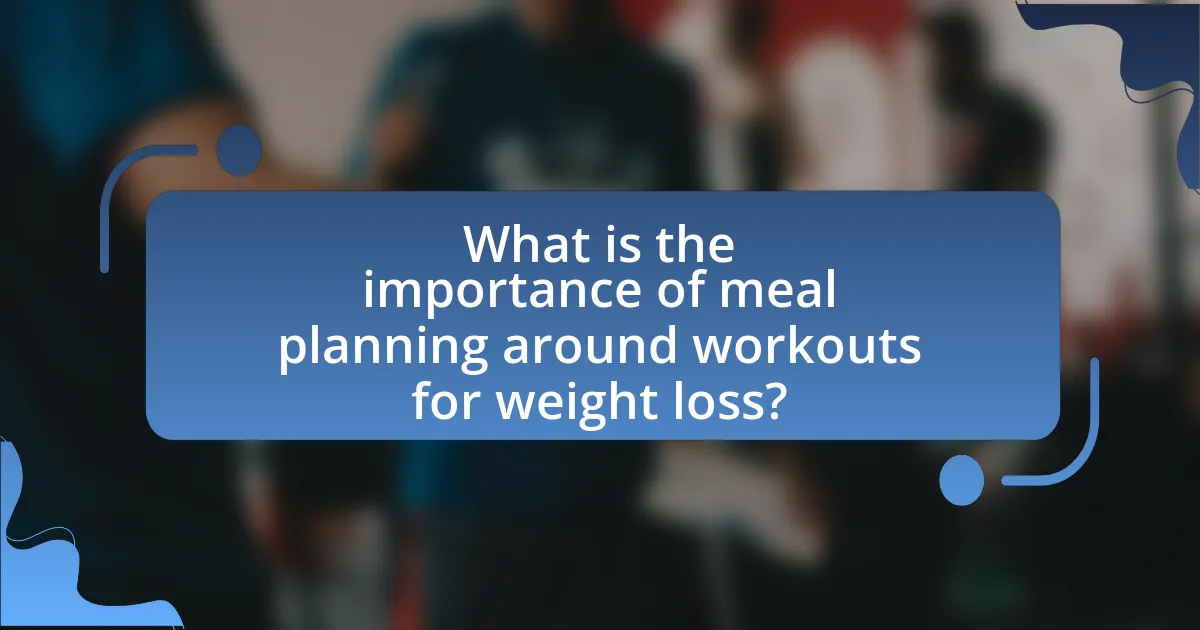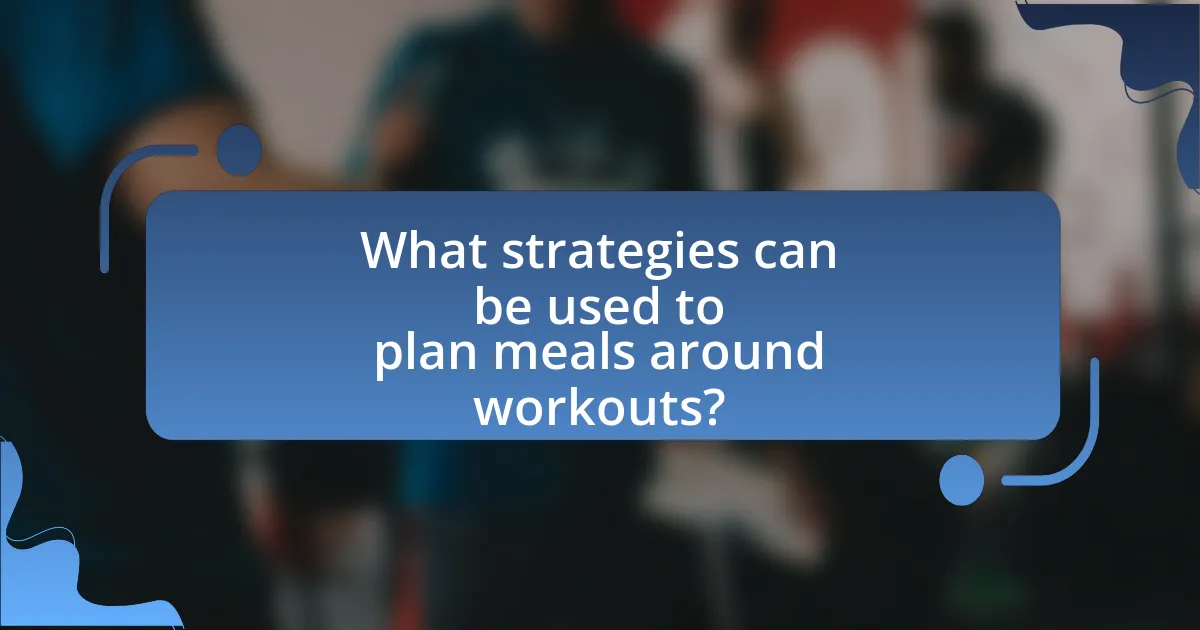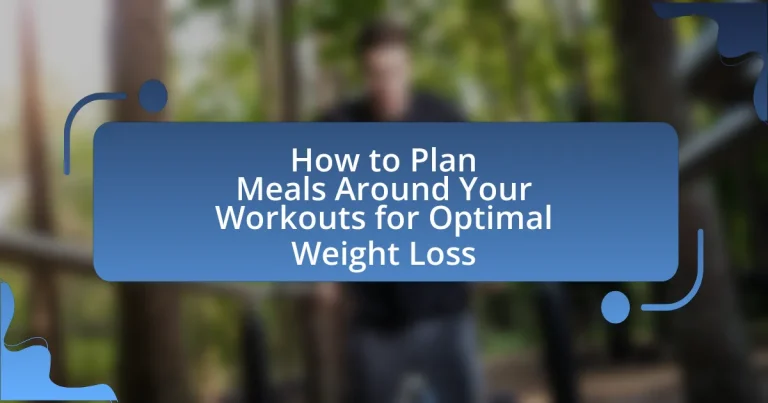The article focuses on the significance of meal planning around workouts for effective weight loss. It emphasizes how proper meal timing and nutrient intake can enhance workout performance, recovery, and adherence to dietary goals. Key topics include the optimal timing for pre- and post-workout meals, the impact of macronutrients on energy levels and metabolism, and strategies for creating a balanced meal plan. Additionally, it addresses common mistakes in meal planning, the role of hydration, and practical tips for successful meal prepping to support weight loss efforts.

What is the importance of meal planning around workouts for weight loss?
Meal planning around workouts is crucial for weight loss as it optimizes energy levels and nutrient intake, enhancing workout performance and recovery. Proper meal timing ensures that the body receives adequate fuel before exercise, which can improve endurance and strength, while post-workout nutrition aids in muscle repair and replenishment of glycogen stores. Research indicates that individuals who strategically plan their meals around physical activity are more likely to adhere to their dietary goals and achieve better weight loss outcomes. For instance, a study published in the Journal of the Academy of Nutrition and Dietetics found that meal timing and composition significantly influenced weight loss success among participants.
How does meal timing influence workout performance?
Meal timing significantly influences workout performance by affecting energy levels, endurance, and recovery. Consuming a meal rich in carbohydrates and protein approximately 2-3 hours before exercise can enhance glycogen stores, leading to improved stamina and strength during workouts. Research published in the Journal of the International Society of Sports Nutrition indicates that pre-exercise meals can optimize performance by providing readily available energy and reducing fatigue. Additionally, post-workout nutrition, particularly protein intake within 30 minutes after exercise, aids in muscle recovery and growth, further enhancing overall performance in subsequent workouts.
What are the best times to eat before and after workouts?
The best times to eat before workouts are 30 to 60 minutes prior, focusing on easily digestible carbohydrates and some protein. Consuming a meal or snack within this timeframe helps to fuel the body and enhance performance. After workouts, it is optimal to eat within 30 minutes to two hours, prioritizing a combination of protein and carbohydrates to aid in recovery and muscle repair. Research indicates that consuming protein shortly after exercise can significantly improve muscle protein synthesis, which is crucial for recovery and growth.
How does meal timing affect energy levels during exercise?
Meal timing significantly affects energy levels during exercise by influencing glycogen availability and metabolic responses. Consuming a meal rich in carbohydrates 2-3 hours before exercise can enhance glycogen stores, leading to improved endurance and performance. Research indicates that athletes who eat a carbohydrate-rich meal prior to workouts experience higher energy levels and better exercise capacity compared to those who do not. For instance, a study published in the Journal of Sports Sciences found that pre-exercise carbohydrate intake can increase performance by up to 20%. Therefore, strategically timing meals around workouts is crucial for optimizing energy levels and overall exercise effectiveness.
Why is nutrition critical for weight loss during workout routines?
Nutrition is critical for weight loss during workout routines because it provides the essential nutrients and energy needed for optimal performance and recovery. Proper nutrition ensures that the body has sufficient fuel to sustain workouts, which can enhance calorie burn and promote fat loss. For instance, a study published in the Journal of the International Society of Sports Nutrition indicates that a balanced intake of macronutrients, particularly protein and carbohydrates, supports muscle repair and growth while maximizing energy levels during exercise. This nutritional support not only aids in achieving weight loss goals but also helps maintain muscle mass, which is vital for a higher metabolic rate.
What macronutrients should be prioritized for weight loss?
Protein should be prioritized for weight loss as it helps preserve lean muscle mass while promoting satiety. Research indicates that higher protein intake can enhance metabolic rate and reduce hunger, leading to lower overall calorie consumption. A study published in the American Journal of Clinical Nutrition found that individuals consuming a high-protein diet lost more weight and maintained muscle compared to those on lower protein diets. Additionally, incorporating healthy fats and complex carbohydrates in moderation can support energy levels and overall health during weight loss efforts.
How do different foods impact metabolism and fat loss?
Different foods significantly impact metabolism and fat loss by influencing energy expenditure and hormonal responses. For instance, high-protein foods can increase the thermic effect of food (TEF), which is the energy required to digest, absorb, and process nutrients, leading to a higher metabolic rate. Research indicates that protein can boost TEF by 15-30%, compared to 5-10% for carbohydrates and 0-3% for fats. Additionally, foods rich in fiber, such as fruits, vegetables, and whole grains, promote satiety and reduce overall calorie intake, aiding in fat loss. Studies show that diets high in fiber can lead to a 10-20% reduction in calorie consumption. Furthermore, healthy fats, like those found in avocados and nuts, can enhance the feeling of fullness and support metabolic health. Overall, the composition of foods directly affects metabolic processes and fat loss efficiency.

What strategies can be used to plan meals around workouts?
To effectively plan meals around workouts, individuals should focus on timing, macronutrient balance, and hydration. Timing meals to coincide with workout schedules enhances energy levels and recovery; consuming a meal rich in carbohydrates and protein 1-3 hours before exercising can optimize performance. Post-workout, a meal or snack containing protein and carbohydrates within 30 minutes aids muscle recovery and replenishes glycogen stores. Research indicates that a balanced intake of macronutrients supports overall workout effectiveness and weight loss; for instance, a study published in the Journal of the International Society of Sports Nutrition highlights the importance of protein for muscle repair and growth. Additionally, maintaining proper hydration before, during, and after workouts is crucial for performance and recovery, as dehydration can impair physical capabilities.
How can you create a balanced meal plan that supports workouts?
To create a balanced meal plan that supports workouts, include a variety of macronutrients: carbohydrates for energy, protein for muscle repair, and healthy fats for overall health. Carbohydrates, such as whole grains and fruits, should comprise 45-65% of total daily calories, as they provide the necessary fuel for exercise. Protein sources like lean meats, legumes, and dairy should make up 10-35% of daily intake to aid in muscle recovery and growth. Healthy fats, found in nuts, seeds, and avocados, should account for 20-35% of total calories to support hormone production and nutrient absorption.
Research indicates that consuming a meal rich in carbohydrates and protein within 30 minutes post-workout can enhance recovery and muscle synthesis (Journal of Sports Sciences, Phillips et al., 2016). Additionally, staying hydrated and timing meals around workouts can further optimize performance and recovery.
What are the key components of a balanced meal for weight loss?
A balanced meal for weight loss consists of lean proteins, healthy fats, whole grains, and a variety of fruits and vegetables. Lean proteins, such as chicken, fish, or legumes, help build and repair muscle while promoting satiety. Healthy fats, like avocados or nuts, provide essential fatty acids and also contribute to feelings of fullness. Whole grains, such as quinoa or brown rice, offer fiber and sustained energy, which is crucial for workouts. Lastly, fruits and vegetables supply vitamins, minerals, and antioxidants, supporting overall health and aiding in weight management. Research indicates that meals incorporating these components can enhance metabolic health and support weight loss efforts effectively.
How can portion control enhance weight loss results?
Portion control enhances weight loss results by regulating calorie intake, which is essential for creating a calorie deficit necessary for weight loss. By consuming smaller portions, individuals can reduce their overall caloric consumption without feeling deprived, making it easier to adhere to a weight loss plan. Research indicates that people who practice portion control tend to consume fewer calories; for instance, a study published in the American Journal of Clinical Nutrition found that participants who used smaller plates ate 30% less than those with larger plates. This demonstrates that managing portion sizes can effectively contribute to weight loss by promoting mindful eating and reducing the likelihood of overeating.
What role does hydration play in meal planning and workouts?
Hydration is crucial in meal planning and workouts as it directly affects physical performance and recovery. Adequate hydration enhances nutrient absorption and energy levels, which are essential for effective workouts. Studies show that even mild dehydration can impair exercise performance, leading to decreased strength, endurance, and cognitive function. For instance, research published in the Journal of Athletic Training indicates that a 2% loss in body weight due to dehydration can significantly reduce athletic performance. Therefore, incorporating proper hydration strategies into meal planning ensures that individuals maintain optimal fluid levels, supporting their workout goals and overall health.
How much water should you consume before, during, and after workouts?
You should consume approximately 17 to 20 ounces of water 2 to 3 hours before a workout, 8 ounces during the workout every 15 to 20 minutes, and 16 to 24 ounces after the workout for every pound lost during exercise. This hydration strategy is supported by the American Council on Exercise, which emphasizes the importance of maintaining fluid balance to optimize performance and recovery. Proper hydration can enhance endurance and reduce the risk of dehydration-related issues during physical activity.
What are the signs of dehydration that can affect workout performance?
Signs of dehydration that can affect workout performance include increased thirst, dry mouth, fatigue, dizziness, and decreased urine output. These symptoms indicate that the body lacks sufficient fluids, which can lead to impaired physical performance. Research shows that even a 2% loss of body weight due to dehydration can negatively impact endurance and strength, leading to decreased exercise capacity and increased risk of injury. Additionally, a study published in the Journal of Athletic Training found that dehydration can impair cognitive function, further affecting workout performance.

What common mistakes should be avoided when planning meals around workouts?
Common mistakes to avoid when planning meals around workouts include neglecting to time meals properly, failing to balance macronutrients, and not considering individual energy needs. Proper meal timing is crucial; consuming a meal too close to a workout can lead to discomfort, while eating too far in advance may result in low energy levels. Balancing macronutrients—carbohydrates, proteins, and fats—is essential for fueling workouts and aiding recovery; for instance, a study published in the Journal of the International Society of Sports Nutrition emphasizes the importance of protein intake post-exercise for muscle repair. Additionally, individual energy needs vary based on factors like workout intensity and duration; ignoring these can lead to inadequate fueling or excessive calorie intake, both of which can hinder weight loss efforts.
How can improper meal timing hinder weight loss efforts?
Improper meal timing can hinder weight loss efforts by disrupting metabolic processes and increasing hunger levels. When meals are consumed at irregular intervals or too close to bedtime, the body may not efficiently utilize nutrients, leading to fat storage instead of fat burning. Research indicates that eating late at night can negatively affect insulin sensitivity, which is crucial for weight management. A study published in the journal Obesity found that individuals who ate their main meal late in the evening had a higher body mass index compared to those who consumed it earlier in the day. This demonstrates that meal timing plays a significant role in weight loss by influencing metabolic rate and appetite regulation.
What are the consequences of skipping meals before workouts?
Skipping meals before workouts can lead to decreased energy levels, impaired performance, and increased risk of injury. When the body lacks adequate fuel, it may not perform optimally, resulting in reduced endurance and strength during exercise. Research indicates that exercising on an empty stomach can lead to muscle breakdown, as the body may utilize muscle protein for energy instead of fat stores. Additionally, low blood sugar levels can cause dizziness, fatigue, and decreased concentration, which can further hinder workout effectiveness. Therefore, proper meal planning around workouts is essential for maintaining energy and maximizing performance.
How can post-workout meals be mismanaged?
Post-workout meals can be mismanaged by failing to consume the appropriate balance of macronutrients, particularly protein and carbohydrates, which are essential for recovery and muscle repair. For instance, research indicates that consuming a meal with a ratio of 3:1 carbohydrates to protein within 30 minutes post-exercise can significantly enhance glycogen replenishment and muscle recovery. Additionally, mismanagement occurs when individuals either skip the meal entirely or opt for unhealthy food choices high in sugars or fats, which can negate the benefits of the workout. Studies show that inadequate post-workout nutrition can lead to prolonged muscle soreness and hinder overall performance in subsequent workouts.
What are some practical tips for effective meal planning around workouts?
To effectively plan meals around workouts, prioritize timing, nutrient balance, and portion control. Consuming a meal rich in carbohydrates and protein 1-3 hours before exercising fuels performance and aids recovery. For instance, a study published in the Journal of the International Society of Sports Nutrition indicates that pre-workout meals enhance endurance and strength. Post-workout, aim to eat within 30 minutes to replenish glycogen stores and support muscle repair, focusing on a mix of protein and carbohydrates. Additionally, preparing meals in advance ensures that healthy options are readily available, reducing the likelihood of unhealthy choices. Tracking macronutrient intake can also help maintain a balanced diet aligned with fitness goals.
How can meal prepping contribute to successful weight loss?
Meal prepping can significantly contribute to successful weight loss by promoting portion control and reducing impulsive eating. When individuals prepare meals in advance, they can accurately measure serving sizes, which helps maintain a calorie deficit essential for weight loss. Research indicates that meal prepping can lead to healthier food choices, as it encourages the inclusion of nutrient-dense foods while minimizing the likelihood of consuming high-calorie, processed options. A study published in the Journal of Nutrition Education and Behavior found that individuals who engaged in meal prepping were more likely to meet their dietary goals and experience weight loss compared to those who did not.
What tools or apps can assist in meal planning for workouts?
MyFitnessPal is a leading app that assists in meal planning for workouts by allowing users to track their food intake and exercise. This app features a comprehensive database of foods, enabling users to log meals easily and monitor their macronutrient intake, which is crucial for optimizing workout performance and weight loss. Additionally, Lose It! is another effective tool that provides personalized meal plans based on individual fitness goals, helping users stay on track with their nutrition. Both apps have been shown to improve dietary adherence, which is essential for achieving weight loss and fitness objectives.


